Back in 2001, DMG Radio launched their brand new metro FM station – Nova 96.9. Since then, DMG Radio has changed its name to Nova Entertainment, and the brand has become a radio ratings powerhouse.
Nova celebrated its 20th birthday on April 1st, and to mark the anniversary, Mediaweek spoke to a number of key people involved in the launch of the brand around Australia.
Mar 29: Nova FM founder Paul Thompson on 20th anniversary of radio disruptor
By James Manning
Thursday April 1 will mark the 20th anniversary of the launch of what was the then DMG Radio [now Nova Entertainment] owned new metro FM station Nova 96.9. The licence for the Sydney station had been purchased 11 months earlier for $150m by a bidder acting on behalf of DMG founding CEO Paul Thompson.
The brand was established to be a radio disruptor and it certainly did that with strong ratings soon after launch for the Sydney station and other Nova stations subsequently around Australia.
Two stations launched in 2001 with others following over the next few years.
The DMG Radio rollout of the Nova brand:
Nova 96.9 Sydney – 1 April 2001
Nova 100 Melbourne – 3 December 2001
Nova 937 Perth – 5 December 2002
Nova 919 Adelaide – August 2004
Nova 106.9 Brisbane – 4 April 2005
To celebrate the radio milestone, Mediaweek has spoken to a number of key people involved in the launch of the brand around Australia. We start today with the founding CEO of DMG Radio, Paul Thompson. Following the introduction of FM radio in Australia, Thompson built two national FM networks. First Austereo and then later Nova.
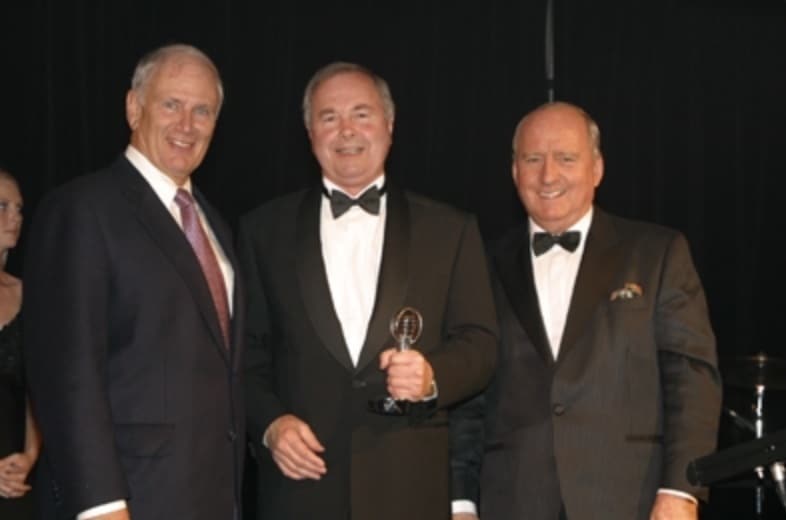
Paul Thompson inducted into Radio Hall of Fame in 2002. With then Communications Minister Richard Alston (left) and 2GB’s Alan Jones
Rivalry between Austereo and Thompson triggered new FM brand
Paul Thompson: The irony of it all was that what is now the Nova group, grew out of events that happened at Austereo who were very bitter rivals. The trigger was the change of ownership at Austereo in the mid-1990s. Before that I was happy to stay at Austereo, perhaps for the rest of my career. It soon became apparent it would be better for everybody if I didn’t stay.
I left Austereo and almost immediately was contacted by DMG in the UK [Daily Mail Group] who asked me to put together a radio group for them.
That was almost impossible in the short term because there were no licences. There was nothing to buy because I had already bought them all as part of the Austereo network. I then started the process of lobbying the government to make more licences available.
If there hadn’t been a change of ownership at Austereo and if I hadn’t started lobbying the government, there wouldn’t have been any new licences.
The entire radio industry, and the wider media industry were lobbying quite hard against any new licences – and I entirely understand that because it meant the revenue pie was going to be shared between more players. There probably would have eventually been more licences issued, but it may have taken many more years to happen.
Lobbying Canberra wasn’t easy
I ran into a brick wall for quite a long time. Because of the lobbying by those opposed to new licences – and they had a lot more pull than I had – most of the ministers at the time were on the side of the industry. I understand that because they had significant influence and I had none. The lobbying went on for several years and was very hard work.
Fake news delayed new radio roll-out
There was a regional radio inquiry held that involved what was then DMG Radio as we controlled a number of regional radio licences. It was really an inquiry into DMG and we uncovered what became known as the bogus letters case where people wrote letters to the government alleging things that DMG Radio had done. All of it was later to be revealed as false as part of a totally bogus campaign. It held things up for quite a long time. After our reputations were eventually cleared the government made the licences available.
Despite the fact we had been the only people lobbying for the licences it didn’t give us any advantage – we had to bid for the licences at auction.
New FM licence auctions
The first domino to fall was Sydney in May 2000 and in due course we were successful with all of the licences in every capital city. Sydney licence cost us close to $150m which was very expensive. The station subsequently went to air in April 2001.
I did attend and bid in Sydney. [Thompson didn’t attend the auction in his home state, instead having someone bid on DMG’s behalf while Thompson waited anxiously nearby.]
Because we had some very serious competitors with very deep pockets, we had a plan. We knew our opponents really wanted to stop me in particular from getting the licence, so I bid to a particular level. When someone went past that level, I threw my hands in the air, looked despondent, indicating we were done.
But we had a wholly-owned subsidiary represented by a lawyer who continued to bid. The competition vanished and our subsidiary managed to pick up the licence.
Partnering with ARN
[The licences for the Nova stations in Brisbane and Perth were bought by Nova Entertainment and ARN under a joint venture agreement.]
If we had gone hard against each other the cost would have been very high for whoever won. It was sensible to form a partnership rather than to batter each other over the head. We also both competed against Austereo, although by then we were less focussed on Austereo. At the beginning it was certainly a driver because they had the audience we needed to get.
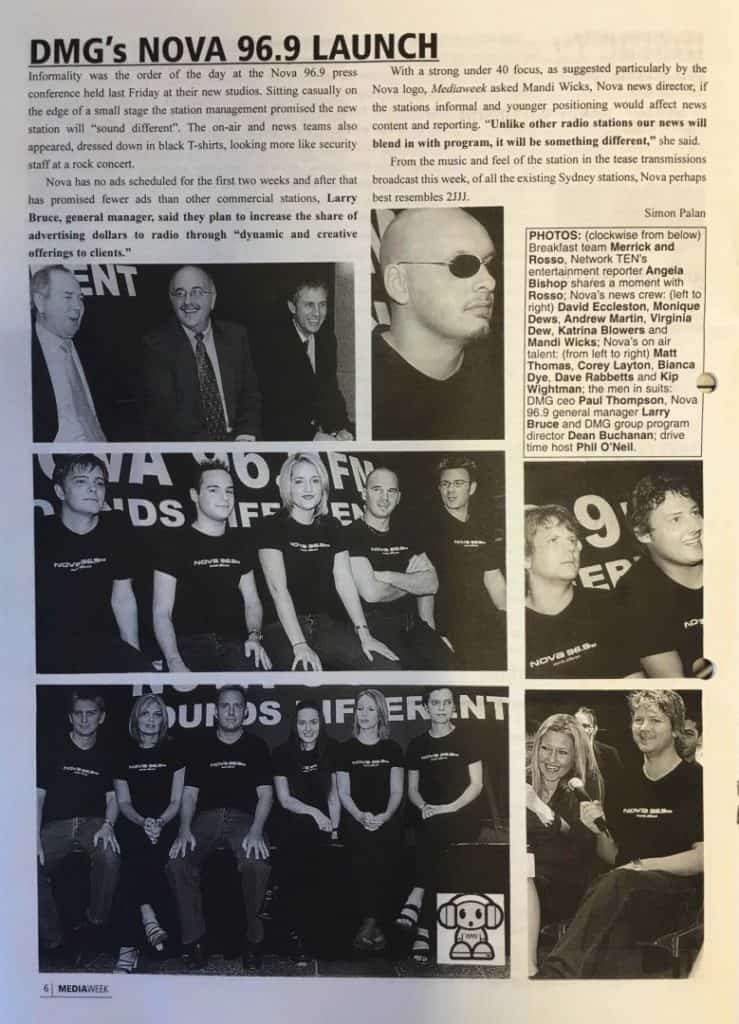
How Mediaweek covered the Nova Sydney launch in our newsletter in April 2001
Nova FM the disruptor
We deliberately chose April 1 to launch as we had wanted the Sydney station and the network to be a disruptor. I felt we couldn’t be successful by trotting out more of the same. Nothing said disruptor better than launching on April Fool’s Day.
We had paid a lot of money for the licence and we needed to impact the market quickly.
Our launch strategy was based around new music, and an irreverent presentation style where we didn’t take ourselves too seriously. We decided to carry a low number of ads for which we charged a premium – never more than two ads in a row.
That was very effective as a disruptor, but in the longer term probably cost us some revenue, but in the short to medium term it was extremely effective.
We should probably have changed it a little sooner than we did. It was very hard for agencies or anybody booking ads on behalf of clients to explain why they were paying more. Most people needed to demonstrate they were buying advertising cheaper than other people could. Our approach flew in the face of that and made things awkward for buyers.
Naming the new network
The name Nova was amongst a list of possible choices the then small team had brainstormed. I looked Nova up and saw that it meant ‘new star’. It also meant ‘new start with a short life’, and I was hoping no one would pick up on that.
Key DMG team at launch
A number of the core team from 20 years ago aren’t in radio now. Keith Thomas [then DMG group sales director] was with me early. For the last decade he has been CEO of Port Adelaide. Another key player back then was Kingsley Hall who was group finance director who is now CFO of Micro X.
Some of the team had worked with me at Austereo, Keith had, and Kingsley had been an auditor for Austereo. Steve Adler was with me on the journey too from the beginning of DMG Radio and he was with me prior to that at Austereo. I also brought across Eriks Celmins and Dan Bradley from Austereo. Cath O’Connor joined a few years later.
The Austereo people were very good, including the ones who stayed with Austereo. Brad March was there as a top programmer and later managing director and Jeff Allis was still there. They were advised by Greg Smith and he was very good too as was Michael Anderson, who worked in sales and was later a CEO.
How Janine Allis disrupted Nova
The initial head of content was going to be Jeff Allis from Austereo. We had talked about him joining for many months. At the same time his wife Janine Allis had what became a fly in the ointment – a concept to create a retail business called Boost Juice. In the end Jeff stayed at Austereo for a short time as he and Janine focussed on their new business. You could not say anything other than it was an enormously good decision on their part. We soon brought in Dean Buchanan who joined the launch team.
Nova Sydney breakfast
Merrick and Rosso arrived from triple j and they were very good. They had someone working with them on some humorous current affairs – his name was Paul Murray who has gone onto big things at Sky News.
Industry response
At the beginning Austereo was almost contemptuous of what we did. Because we challenged every precept in radio they didn’t regard what we had done highly at all. That position changed as time went by. I was told by some of their executives they thought we had messed up the launch.
Thompson’s departure
I started with DMG Radio in the late 90s and then retired on June 30, 2010. I suffered a mild stroke in 2006 and it was a bad time because it was when we were launching Vega. I realised it was time to start planning the exit. By that time I had brought across Cath O’Connor and she was the likely successor. I gave DMG a year’s notice and somewhere during that 12 months DMG spoke with Lachlan Murdoch and he acquired a shareholding. I stayed a little longer as an advisor to Lachlan and Cath was appointed as the new CEO.
Retirement: no regrets
I had worked for maybe 70 hours a week for close to 40 consecutive years. I was actually ready. I consulted for a little while after retiring, but I didn’t enjoy consulting like some people do because you don’t have the power to implement what you are recommending.
That was the first time I found myself in the position of recommending something, but not being able to follow through and implementing it.
Because I had worked such long hours and travelled at least 45 weeks a year. I found that very demanding and talking about work/life balance, I had none. I had four kids and I was often not around.
I stopped working entirely and never had a moment’s regret. People ask ‘How can you just stop?’ I found it really easy. No problems whatsoever and I never contemplated working somewhere else.
Don’t ask Paul Thompson about state of the industry
I have been scrupulously careful not to offer any comment as to what people should do. There is nothing worse than that. I remember when I started there were lots of older radio people offering advice. I thought I would never be like that.
Success had only one blemish
The Nova story is about as close to a total success as it could be. It was right for the generation of management under Cath O’Connor to focus on higher advertising content to maximise revenue. Nova was a disruptor, but is no longer a disruptor and probably no longer needs to be. Nova now is what it should be for the times.
The only negative for me in the company that was DMG was the launch of Vega which wasn’t successful. Of course smooth FM is now extremely successful about which I am absolutely delighted. And I am also very happy Nova has gone on to greater heights.
Mar 20: Celebrating 20 years of Nova FM: Tim Blackwell remembers his radio start
By James Manning
When Nova 96.9 launched on April 1 20 years ago, there was an aspiring radio announcer at AFTRS called Tim Blackwell (above left with Kate Ritchie and Joel Creasey) looking for his break in the industry. Little did he know that before the year was out he would be working at Australia’s newest FM brand and would go on to be the launch announcer on another its new FM stations.
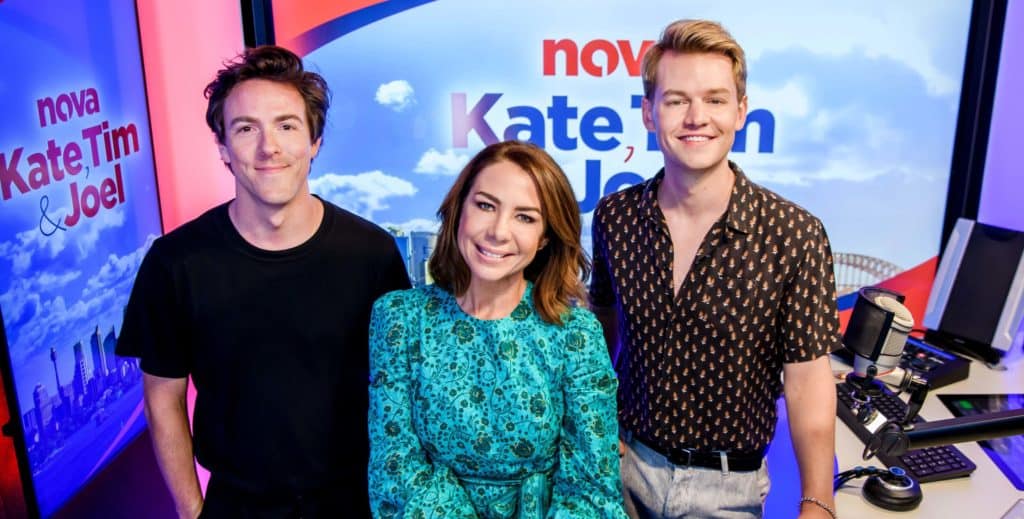
On his way to AFTRS every morning Tim Blackwell would pick up his colleague who has also done very well since graduating, Triple M Sydney breakfast presenter Chris Page, and they would strategise about how to get a gig in radio as the red Toyota Starlet weaved through the traffic.
“The funny thing is we were obsessed with listening to the new Merrick and Rosso Nova show, partly because they were playing pretty crazy music we’d never heard on commercial radio before,” Blackwell told Mediaweek. “It was the best time to be studying because Nova had everyone in Sydney talking about radio.”
In 2000 Tim Blackwell was sending out demo tapes to anybody he thought might be hiring – including Nova’s new content executives Dean Buchanan and Dan Bradley.
“I got a handwritten letter back from Dan Bradley offering me a chance to be part of a DMG station that hadn’t yet been announced as another Nova station. The starting salary was $36,000 and I jumped at it as it was $36,000 more than I had ever earned in a year before.”
Between accepting the job and moving to Melbourne, DMG sent Blackwell to Albury to get some commercial radio experience at the Star FM hub, one of DMG Radio’s regional business centres. “I ended up hosting drive from 2pm until 7pm to about nine different regional markets. We had about 10 talk breaks an hour and seven of them had to be local. I’m not good at math, but it was a lot of breaks to navigate. To this day I have never worked harder than during those months in Albury.”
When Nova 100 Melbourne went to air late in 2000, Blackwell hosted midnight to 6am, along the way forming a friendship with Dave Hughes and Kate Langbroek who turned up at the station at 5am each day to prepare for breakfast.
“I would hang around for the first hour of their show to watch them work. I later got moved into a late evening slot, 10pm until 1am.
“Looking back I was just so lucky to be part of the launch of a brand and a station like that.”
From Melbourne, Blackwell was moved to Perth where he was the launch announcer when Nova 937 went to air in December 2002.
“To make it even more nerve wracking for me, I was sharing the studios with the Red Hot Chili Peppers, Dean Buchanan, crews from every TV news network. Also with us was Lord Rothermere, the UK proprietor of DMG, at the only Australian launch he attended. He stood behind me and I was absolutely pooing myself.”
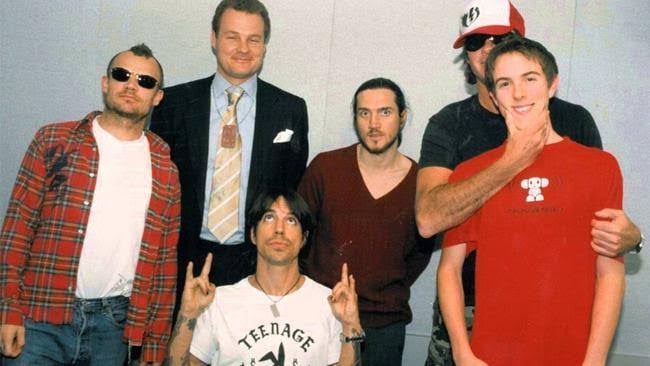
A young Tim Blackwell [right] in 2002 with The Red Hot Chili Peppers and DMG proprietor Lord Rothermere
The DMG Radio rollout of the Nova brand:
Nova 96.9 Sydney – 1 April 2001
Nova 100 Melbourne – 3 December 2001
Nova 937 Perth – 5 December 2002
Nova 919 Adelaide – August 2004
Nova 106.9 Brisbane – 4 April 2005
Adelaide is the only market where Tim Blackwell hasn’t lived in for Nova. He’s heard there on drive daily though.
After Perth, this Nova announcer went to Sydney, back to Melbourne, then to Brisbane, back to Melbourne and is again in Sydney where he is part of the talented drive team Kate, Tim and Joel, Australia’s #1 drive show.
As to how DJs warmed to the original “never more than two ads in a row” plan, Blackwell said. “Announcers had to make sure they didn’t need a toilet stop, as there was never a break longer than one song. Because for every ad and every promo spot we were playing live manually. The listeners absolutely loved the low ad load. A 60 second ad break is easy to deal with and then the listeners didn’t know what we were going to play next. It was a crazy playlist.
“All the markets had very different music too. When new music arrived the PDs would run the corridor and give you the CD that had just arrived from the record company.”
Blackwell can’t remember any run-ins with the PDs during the launch years. “Except that some PDs wanted a caller in every break. And that had never made any sense to me. “Otherwise the instruction was a simple, ‘Keep it light, keep it bright.’ Something that many music jocks still get today.”
Nova sounds different now to what is was two decades ago, but Blackwell said so it should. “Radio has always moved with the times. We are exactly where we need to be for the people who are consuming our product. When the iPod was first released we thought people with 10,000 songs in their pocket with no ads would be the end of radio. But it continues to thrive.”
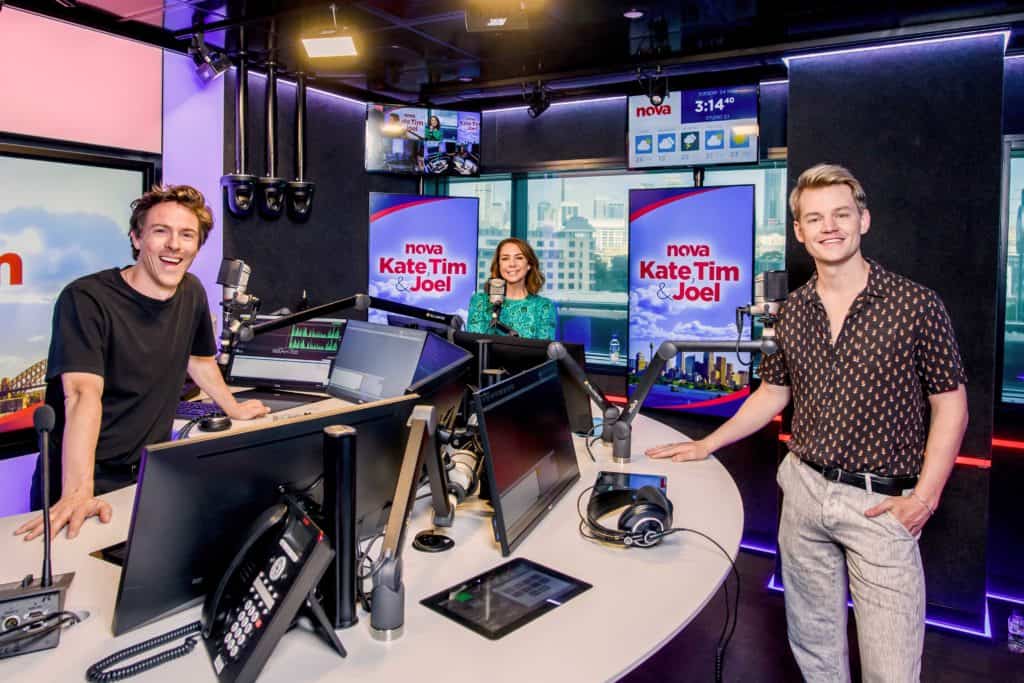
Tim Blackwell [left] in the studio with Kate and Joel
There is more focus on things between the songs today in radio, said Blackwell. “Something your competitor doesn’t have is your show and the show’s slant on something. It is a great time to be an announcer in breakfast, drive or the evening because you are just as important as the songs.
“The rise of podcasting has indicated that people are not allergic to hearing people talk on the radio.”
Over the 20 years at Nova Blackwell has never had a reason to think about leaving, noting that every job change within the network had advanced his career. He left Melbourne breakfast radio with Hughesy and Kate to co-host in Brisbane with Meshel Laurie. That led to drive where the successful Kate, Tim and Marty show has morphed into Kate, Tim and Joel.
Mar 31: Radio numbers man John McCool on how Nova built a new network
By James Manning
In August 1998 John McCool joined Daily Mail & General Trust (DMGT) in the UK on their DMG Radio division, two years before the company acquired its first Nova licence. “At that stage we had around 10 stations around London, a station in Hungary, one in Sweden and our Australian regional network with Fiveaa,” McCool told Mediaweek.
After working closely with the Australian team from London, he jumped at the opportunity to work here for a year. “I had never been to Australia and I thought it would be great experience and I’d get to see the country.” Twenty years later and he’s still here.
McCool was one of the finance team spending close to $400m the new FM licences that became the Nova network. “I was originally part of the team back in London building the initial business model for Sydney and Melbourne. We were going up against real heritage stations in those markets. All credit to Paul Thompson who was a real visionary and was able to launch something completely different.
“In addition to the massive challenge to break into the two major markets initially, we had to face-off against strong competition to have the winning bids for the other licences and then the second round of licences for Sydney and Melbourne.”
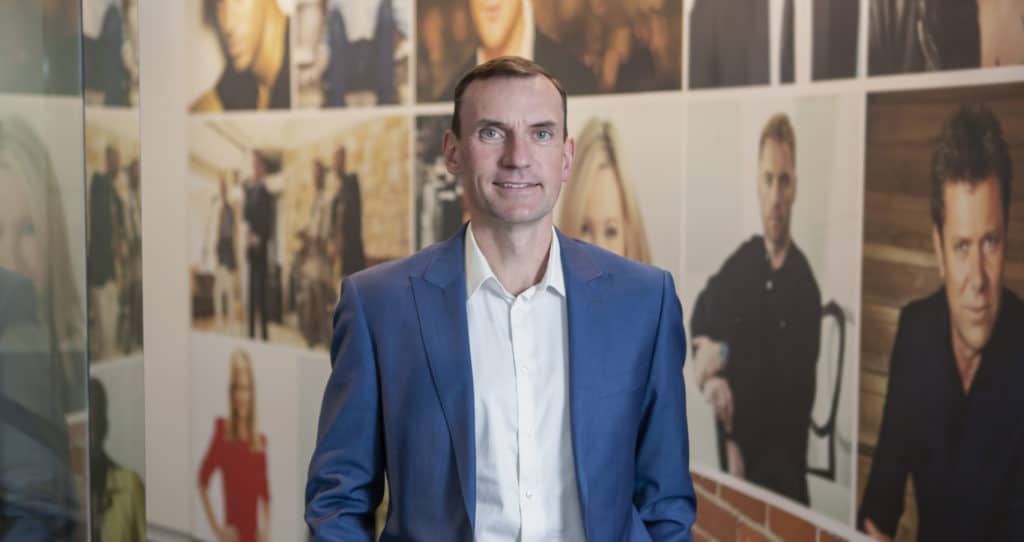
Nova Entertainment’s John McCool
These days McCool is Melbourne-based where he is Nova Entertainment’s commercial manager. This week Mediaweek is celebrating the launch of the first DMG Nova station 20 year ago on April 1.
The DMG Radio rollout of the Nova brand:
Nova 96.9 Sydney – 1 April 2001
Nova 100 Melbourne – 3 December 2001
Nova 937 Perth – 5 December 2002
Nova 919 Adelaide – August 2004
Nova 106.9 Brisbane – 4 April 2005
At the time the Sydney and Melbourne licences were purchased in 2000, McCool said they didn’t know if there would be second licences in those markets, although they were hoping there would be.
McCool was acutely aware how important the initial revenue would be and watched as the low ad model was rolled out. “The executive team at the time had so much faith in the strategy. Paul Thompson and Keith Thomas had organised research into it which showed how strong the greater engagement and retention was from being first and last in break.”
Although Paul Thompson told Mediaweek it may have cost them some revenue initially, McCool said never more than two ads in a row did help ad buyers take notice of the new brand immediately.
As the Nova stations launched around Australia, McCool noted how the existing broadcasters wanted to maintain their audience share. “They all wanted to protect their patch and not let us in. As any company would, they were very keen to defend their position. It was quite a battle and we didn’t always get it right.
“When we launched Vega it didn’t quite hit the mark. We eventually got it right though and we couldn’t have dreamt the two smoothfm stations would be so successful. In hindsight it was obviously the right move to make.”
One of McCool’s earliest memories of his time in Australia was watching the climb in the ratings at Fiveaa. “I was working in Adelaide and for some time the station had been #4 or #5 in the ratings. On 11 September 2001 it went #2 for the first time.” McCool noted it was easy to remember the date as later that day 9/11 happened just as they were arriving home after celebrating the ratings turnaround.
Another memorable event was the day of the Adelaide FM licence auction. “Paul Thompson was cautious of what the price might be given it was his home market. Paul didn’t want to confirm DMG would even bid and he didn’t attend the auction. We did however have someone there who bid for us. I was the only one actually from DMG at the auction and I was on a phone at the back of room relaying bidding details to Paul and Kingsley Hall back in the DMG boardroom. I was able to give them the good news they had won the Adelaide licence and I heard the screams of joy from the team in the boardroom when they got the news.”
Working as an accountant, McCool considers himself fortunate to be working on what he calls a dynamic and vibrant company. “To be able to work with people with different skillsets and backgrounds is very fortunate. It’s a great place to work with everyone working for the same goal to make the brands as successful as possible. There’s a really good culture here.
“With Covid over the past 12 months it’s a testament to the team how well they have coped over that time. What we have learned from that is to have more flexible working arrangements, something we are setting up now for the future.”
Apr 1: Nova turns 20: DJ and web skills kept Ty Frost at Nova and then smoothfm
By James Manning
Thanks to all at Nova who supported this initiative – they know who they are! We would have liked to talk to many of the Nova army – past and present – but had to make the call on just speaking to a handful of people.
Mediaweek will continue to cover the whole radio industry – including ARN, SCA, Nine, Grant – as we have done for the past 31 years.
Ty Frost tracks his time with DMG Radio and then Nova Entertainment back to 1995 when the regional radio business came under control of the UK owners and their Australia CEO Paul Thompson. Frost’s time on air out of DMG regional hub in Albury included hosting a drive show across a number of regional markets.
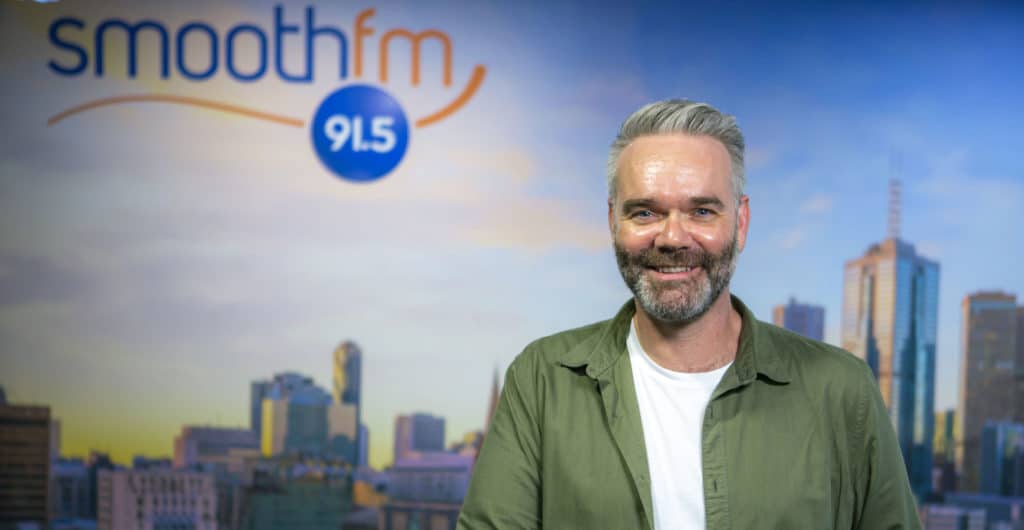
Frost remembers working with Tim Blackwell in Albury during Blackwell’s time there learning the ropes before Blackwell and Frost both ended up at Nova 100 at launch.
“It was very exciting when DMG Radio revealed it would be going after cap city radio stations,” Frost told Mediaweek. “Working in regional radio I was keen to try and get on a new cap city licence. In addition to being an announcer, I was an internet nerd and knew a bit about websites. When Nova 96.9 launched I flew myself up to Sydney and spent a day with the webmaster as I wondered if I could do that job. I built the radio station website in Albury, but I was a rank amateur!
“On the recommendation of the Sydney webmaster, Dan Bradley asked me to come to Melbourne and be the web guy and also do some floating work as a weekend announcer. It wasn’t quite what I had envisaged, but in life it very rarely is.
“Being at Nova 100 for the launch was an incredible experience. Officially Kate Langbroek was the first voice heard on that Nova station. In reality the first voice was heard on test broadcasts. They had tested everything in the studios, but nobody had ever spoken into the microphones before. I was asked to read from a newspaper and test the microphones and I can claim to have been the first live voice on Nova 100.”
Frost kept up DJ and webmaster roles at Nova for several years and also worked with new talent to teach them the panel etc. There were some memorable Nova ratings celebrations along the way. “You can still see the champagne cork indentations in the roof outside the program director’s office,” said Frost.
Program directors can be very direct at times. Frost remembers back to the mid-2000s when then Nova 100 program director Todd Campbell said to Frost one day: “Mate, you’re not sounding right for Nova. Maybe a bit old.”
Frost thought his days on air might be behind him. “I had worked on the web side of the business as the Vega and Classic Rock brands came and went. I was then asked to do a demo for something that Paul Jackson was thinking of doing. Apparently I was exactly what they were after for what became the new station smoothfm.
“Here’s me thinking I would a digital web nerd for the rest of my life, and I would have been happy doing it. Rowan Brown at the time was working on the new brand in Melbourne, but he wouldn’t tell me much. I found out it was going to be smoothfm along with everyone else in the building.
“I was very happy to walk into what seemed like the best job in the world and it’s been amazing ever since.”
smoothfm launched with local breakfast and drive shows. Now all dayparts are syndicated except breakfast and Frost has been doing mornings into Sydney and Melbourne since launch. The station is currently #1 in Sydney and #2 in Melbourne in mornings.
Frost stopped dabbling with html soon after the smoothfm launch. “While radio hosting basics don’t change, the world of internet technology has certainly moved along a lot. I’m sure our engineering department still claims I like to get involved in some things.
“I made a point of visiting the new Sydney studios recently during a break and it was such a treat.”
Frost reckons Nova is still a very cool brand. “Although I must admit I drop smooth a bit more these days!” When asked if the survey celebrations are more restrained at smoothfm, Frost said he’s call them “classier”. He added: “More sit-down dinners than having shots at the bar.”
The playlists merge sometimes, but not often. “At smoothfm I haven’t played Yakuza Cocaine yet! smoothfm is a little more upbeat now though as your feelgood radio station. There is certainly an opportunity to play more up songs.”
